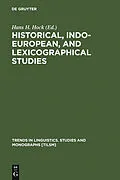TRENDS IN LINGUISTICS is a series of books that open new perspectives in our understanding of language. The series publishes state-of-the-art work on core areas of linguistics across theoretical frameworks, as well as studies that provide new insights by approaching language from an interdisciplinary perspective.
TRENDS IN LINGUISTICS considers itself a forum for cutting-edge research based on solid empirical data on language in its various manifestations, including sign languages. It regards linguistic variation in its synchronic and diachronic dimensions as well as in its social contexts as important sources of insight for a better understanding of the design of linguistic systems and the ecology and evolution of language.
TRENDS IN LINGUISTICS publishes monographs and outstanding dissertations as well as edited volumes, which provide the opportunity to address controversial topics from different empirical and theoretical viewpoints. High quality standards are ensured through anonymous reviewing.
To discuss your book idea or submit a proposal, please contact Birgit Sievert.
Zusammenfassung
No detailed description available for "Historical, Indo-European, and Lexicographical Studies".
Das E-Book Historical, Indo-European, and Lexicographical Studies wird angeboten von De Gruyter und wurde mit folgenden Begriffen kategorisiert:
Zgusta, Ladislav,Bibliographie
Inhalt
Publications of Ladislav Zgusta. Part 1 Indo-European and general historical linguistic studies: nexus and "extraclausality" in Verdic, or "sa-fige" all over again - an historical (re)examination, Hans Henrich Hock; some archaisms in the Illiad, Henry M. Hoenigswald; the origin and evolution of primary derivative suffixes in Dravidian, Bh. Krishnamurti; ex oriente nox, W.P. Lehmann; Indo-European religion, Edgar C. Polome; archaism and innovation in proto-Celtic?, Karl Horst Schmidt; on Old Persian hypocoristics in -iya-, Rudiger Schmitt; some problems of Latin adverbs, Oswald Szemerenyi; Hittite telipuri-"district, precinct", Johann Tischler; lexical archaisms in the Tocharian languages, Werner Winter. Part 2 Papers on lexicography and history of linguistics: corrections and additions to the Ossetic etymological dictionary, V.I. Abaev; more on the diccionario Griego-Espanol, Francisco R. Adrados; uphill with Dasypodius - on the lexicographic treatment of weak nouns in German, Elmer H. Antonsen; the gnosiological and dianoetic aspects of language and the limitedness of G.B. Vico's theory, Walter Belardi; re-constructing ideology, part one - animadversions of John Horne Tooke on the origins of affixes and non-designative words, Frederic Dolezal; Greek maulisterion and its group - a lexicographical essay, Olivier Masson; the vocabulary of culture - a potential method of contrastive description, Oskar Reichmann; the lexical semitisms of Septuagint Greek as a reflex of the history of the Hebrew vocabulary - implications concerning lexical diachromy and historical lexicography, Haiim B. Rosen; printed language dictionaries and their standardization - notes on the progress towards a general theory of lexicography, Herbert Ernst Wiegand.
